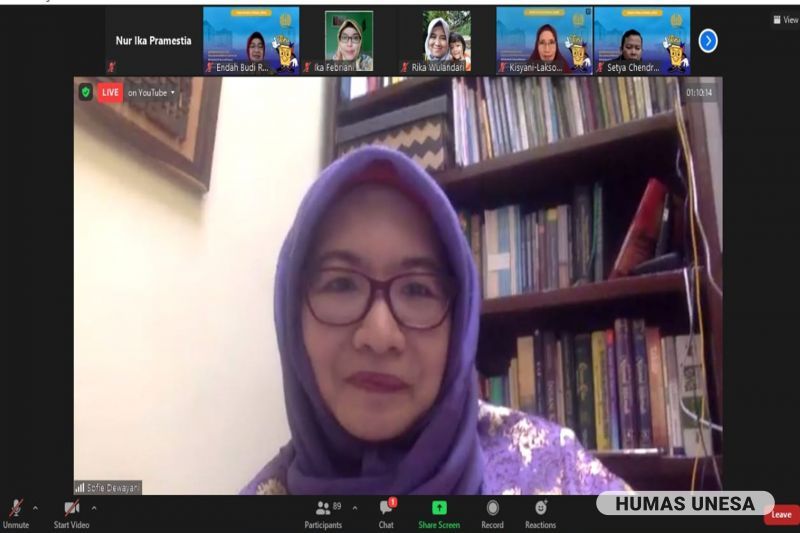
www.unesa.ac.id
Unesa.ac.id, Surabaya-In order to commemorate the month of education and as an effort to increase the love of the world of literacy and support the implementation of the Minimum Competency Assessment (AKM) system, the Center for Literacy Studies, LPPM Unesa held a series National Online Workshop (Sadaring) with the theme "Assessment and Learning".
This activity was held through Zoom, Youtube, and SARGRAM on Saturday (29/05/2021). A total of 286 participants joined the event. They come from various regions and various professions.
The AKM and learning systems are important things to be studied together so that they can run smoothly, for this reason the Center for Literacy Studies, LPPM invited three speakers and experts on this issue, namely Sofie Dewani, PhD as Chair of the GLS Task Force, Founder of the Litara Foundation, Prof. Dr. Ekohariadi, M.Pd. as Professor of the Faculty of Engineering, Unesa, and Prof. Dr. Suyatno, M.Pd as Professor of the Faculty of Language and Arts, Unesa.
Vice Chancellor for Academic Affairs, Prof. Dr. Bambang Yulianto, M.Pd, on the opportunity to open and give a speech at the workshop. He hopes that this activity can answer problems and questions from the community and educators in implementing the AKM and learning systems.
According to him, the discussion at the event was very interesting, because it was in accordance with the ministry's policy which emphasized the importance of minimum competency assessment. In addition, many of the teaching staff need information and knowledge about AKM. "This workshop will answer the participants' questions regarding AKM. Learning is also very important as an element of support for AKM such as digital literacy, "said Bambang.
Sofie Dewani in her presentation said that reading skills do not happen automatically, but teachers must demonstrate and teach how to think strategies in reading activities. "This is a paradigm in the learning process so that assessment affects learning," he said.
Furthermore, Sofie explained that reading literacy in AKM consists of finding information, understanding information both literally and inferentially, and assessing information (evaluating and reflecting). "This AKM really puts students 'abilities in that the teacher must teach according to the students' abilities, learning centered on text or reading, and various reading learning methods, for example reading aloud interactive, reading together, guided reading," said the Head of the GLS Task Force.
Meanwhile, Suyatno explained related to Literacy-Based Learning Techniques. The Professor of FBS Unesa mentioned three literacy-based keywords called TMT (Find, Mean, and Follow Up).
He described, finding means requiring a variety of techniques such as techniques to classify, compare, to find information. Meaning contains association techniques, metaphors, present, and others. Meanwhile, follow-up is a strategy or what to do after doing something.
Suyatno added various other literacy-based learning techniques, namely table techniques, mind map techniques, rewriting techniques, creating graphics, writing, and objects, changing pictures, songs, writing, and movements, completing them with your own ideas, identifying the contents of writing, images, motion and then. "Don't be afraid," ordered Suyatno to educators.
Why is digital literacy important? This question was answered by a third resource person, Ekohariadi, who discussed Digital Literacy Assessment and Learning. "We are facing a knowledge-based economy that uses digital tools which are a means of empowering students to be successful in the world of work, as a means of communication, collaboration and participation, as well as a means of finding information, data and digital content so that digital literacy is very important," said Ekohariadi. . (ESTI / zam)
Share It On:






